英语世界翻译大赛原文教学内容
第七届翻译大赛英文原文
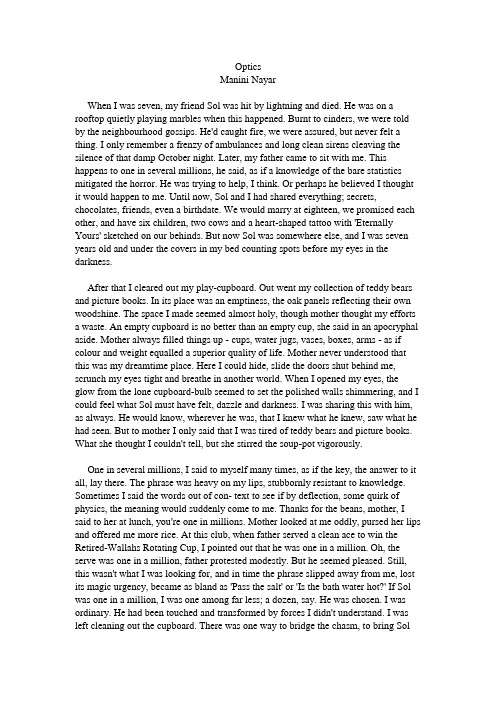
OpticsManini NayarWhen I was seven, my friend Sol was hit by lightning and died. He was on a rooftop quietly playing marbles when this happened. Burnt to cinders, we were told by the neighbourhood gossips. He'd caught fire, we were assured, but never felt a thing. I only remember a frenzy of ambulances and long clean sirens cleaving the silence of that damp October night. Later, my father came to sit with me. This happens to one in several millions, he said, as if a knowledge of the bare statistics mitigated the horror. He was trying to help, I think. Or perhaps he believed I thought it would happen to me. Until now, Sol and I had shared everything; secrets, chocolates, friends, even a birthdate. We would marry at eighteen, we promised each other, and have six children, two cows and a heart-shaped tattoo with 'Eternally Yours' sketched on our behinds. But now Sol was somewhere else, and I was seven years old and under the covers in my bed counting spots before my eyes in the darkness.After that I cleared out my play-cupboard. Out went my collection of teddy bears and picture books. In its place was an emptiness, the oak panels reflecting their own woodshine. The space I made seemed almost holy, though mother thought my efforts a waste. An empty cupboard is no better than an empty cup, she said in an apocryphal aside. Mother always filled things up - cups, water jugs, vases, boxes, arms - as if colour and weight equalled a superior quality of life. Mother never understood that this was my dreamtime place. Here I could hide, slide the doors shut behind me, scrunch my eyes tight and breathe in another world. When I opened my eyes, the glow from the lone cupboard-bulb seemed to set the polished walls shimmering, and I could feel what Sol must have felt, dazzle and darkness. I was sharing this with him, as always. He would know, wherever he was, that I knew what he knew, saw what he had seen. But to mother I only said that I was tired of teddy bears and picture books. What she thought I couldn't tell, but she stirred the soup-pot vigorously.One in several millions, I said to myself many times, as if the key, the answer to it all, lay there. The phrase was heavy on my lips, stubbornly resistant to knowledge. Sometimes I said the words out of con- text to see if by deflection, some quirk of physics, the meaning would suddenly come to me. Thanks for the beans, mother, I said to her at lunch, you're one in millions. Mother looked at me oddly, pursed her lips and offered me more rice. At this club, when father served a clean ace to win the Retired-Wallahs Rotating Cup, I pointed out that he was one in a million. Oh, the serve was one in a million, father protested modestly. But he seemed pleased. Still, this wasn't what I was looking for, and in time the phrase slipped away from me, lost its magic urgency, became as bland as 'Pass the salt' or 'Is the bath water hot?' If Sol was one in a million, I was one among far less; a dozen, say. He was chosen. I was ordinary. He had been touched and transformed by forces I didn't understand. I was left cleaning out the cupboard. There was one way to bridge the chasm, to bring Solback to life, but I would wait to try it until the most magical of moments. I would wait until the moment was so right and shimmering that Sol would have to come back. This was my weapon that nobody knew of, not even mother, even though she had pursed her lips up at the beans. This was between Sol and me.The winter had almost guttered into spring when father was ill. One February morning, he sat in his chair, ashen as the cinders in the grate. Then, his fingers splayed out in front of him, his mouth working, he heaved and fell. It all happened suddenly, so cleanly, as if rehearsed and perfected for weeks. Again the sirens, the screech of wheels, the white coats in perpetual motion. Heart seizures weren't one in a million. But they deprived you just the same, darkness but no dazzle, and a long waiting.Now I knew there was no turning back. This was the moment. I had to do it without delay; there was no time to waste. While they carried father out, I rushed into the cupboard, scrunched my eyes tight, opened them in the shimmer and called out'Sol! Sol! Sol!' I wanted to keep my mind blank, like death must be, but father and Sol gusted in and out in confusing pictures. Leaves in a storm and I the calm axis. Here was father playing marbles on a roof. Here was Sol serving ace after ace. Here was father with two cows. Here was Sol hunched over the breakfast table. The pictures eddied and rushed. The more frantic they grew, the clearer my voice became, tolling like a bell: 'Sol! Sol! Sol!' The cupboard rang with voices, some mine, some echoes, some from what seemed another place - where Sol was, maybe. The cup- board seemed to groan and reverberate, as if shaken by lightning and thunder. Any minute now it would burst open and I would find myself in a green valley fed by limpid brooks and red with hibiscus. I would run through tall grass and wading into the waters, see Sol picking flowers. I would open my eyes and he'd be there,hibiscus-laden, laughing. Where have you been, he'd say, as if it were I who had burned, falling in ashes. I was filled to bursting with a certainty so strong it seemed a celebration almost. Sobbing, I opened my eyes. The bulb winked at the walls.I fell asleep, I think, because I awoke to a deeper darkness. It was late, much past my bedtime. Slowly I crawled out of the cupboard, my tongue furred, my feet heavy. My mind felt like lead. Then I heard my name. Mother was in her chair by the window, her body defined by a thin ray of moonlight. Your father Will be well, she said quietly, and he will be home soon. The shaft of light in which she sat so motionless was like the light that would have touched Sol if he'd been lucky; if he had been like one of us, one in a dozen, or less. This light fell in a benediction, caressing mother, slipping gently over my father in his hospital bed six streets away. I reached out and stroked my mother's arm. It was warm like bath water, her skin the texture of hibiscus.We stayed together for some time, my mother and I, invaded by small night sounds and the raspy whirr of crickets. Then I stood up and turned to return to my room.Mother looked at me quizzically. Are you all right, she asked. I told her I was fine, that I had some c!eaning up to do. Then I went to my cupboard and stacked it up again with teddy bears and picture books.Some years later we moved to Rourkela, a small mining town in the north east, near Jamshedpur. The summer I turned sixteen, I got lost in the thick woods there. They weren't that deep - about three miles at the most. All I had to do was cycle forall I was worth, and in minutes I'd be on the dirt road leading into town. But a stir in the leaves gave me pause.I dismounted and stood listening. Branches arched like claws overhead. The sky crawled on a white belly of clouds. Shadows fell in tessellated patterns of grey and black. There was a faint thrumming all around, as if the air were being strung and practised for an overture. And yet there was nothing, just a silence of moving shadows, a bulb winking at the walls. I remembered Sol, of whom I hadn't thought in years. And foolishly again I waited, not for answers but simply for an end to the terror the woods were building in me, chord by chord, like dissonant music. When the cacophony grew too much to bear, I remounted and pedalled furiously, banshees screaming past my ears, my feet assuming a clockwork of their own. The pathless ground threw up leaves and stones, swirls of dust rose and settled. The air was cool and steady as I hurled myself into the falling light.光学玛尼尼·纳雅尔谈瀛洲译在我七岁那年,我的朋友索尔被闪电击中死去了。
汉英翻译实践第一讲讲课讲稿

汉英翻译实践第一讲PART I:I. 原文(Source Text)水桥在巴拿马,有一座世界闻名的“水桥”,那就是巴拿马运河。
去年暑假,我跟着爸爸妈妈去巴拿马运河游览观光,至今还记忆犹新。
我们乘机抵达巴拿马城,然后搭上了一艘游轮,从巴尔博亚港进入运河。
船行13公里后,便到了运河的第一组水闸1。
巴拿马运河就是通过水闸的关与开,让船舰跨越陆地的一座“水桥” 2。
我们开始“上桥”了。
船驶进闸池之后,厚2米,高、宽各20米,重数百吨的钢闸门便缓缓地关闭,闸池里开始注水。
几分钟后,水涨船高3。
游轮在两岸电力机车的牵引下缓缓前进。
这样连升两级之后,船已经升高了16米。
出闸后,再驶过一个小湖,又到了第二组水闸。
经过这座水闸,船又升高了9.5米。
这样,船已高出海平面26米,进入“桥顶”4。
我们的游船驶进了长达13公里的主航道,只见5两岸山6如刀削,绿树红花,景色十分秀丽7。
游船出了峡谷,驶入了宽阔的加通湖。
湖水倒映着远山白云,美丽的小岛时隐时现8。
在湖中悠悠航行38公里之后,船来到了加通水闸,从此进入了“下桥”段。
这座水闸共有三级,犹如三个巨大的台阶。
游船经过加通水闸后,已经降到了与大西洋水面相同的高度。
当船驶入利蒙湾时,美丽的加勒比海便出现在眼前9。
我们从太平洋来到大西洋10,彼此隔离的大洋因为有了巴拿马运河而相通。
运河全长81.8公里,宽度由150米到304米不等。
5万吨级的巨轮,日夜畅通无阻。
它无愧于“世界桥梁”的称誉。
我由衷地赞美人类改造自然的智慧和勇气!我敬佩你,巴拿马人民!导游告诉我们,巴拿马人民是有志气的。
他们一方面正在改造现在这条运河;另一方面,还准备新建一条更长的运河,预计工程需要10年才能完成,它将成为人类有史以来最大的工程11。
我们期待着它早日完成。
II. 理解难点提示(Suggestions for Comprehension)1. 这里的“水闸”指什么?参考下文的“进闸池”、“出闸”。
翻译大赛第一届“《英语世界》杯”翻译大赛原文及参考译文

翻译大赛第一届“《英语世界》杯”翻译大赛原文及参考译文第一届“《英语世界》杯”翻译大赛原文及参考译文2010年原文Plutoria Avenue By Stephen LeacockThe Mausoleum Club stands on the quietest corner of the best residential street in the city. It is a Grecian building of white stone. Above it are great elm-trees with birds—the most expensive kind of birds—singing in the branches. The street in the softer hours of the morning has an almost reverential quiet. Great motors move drowsily along it, with solitary chauffeurs returning at 10.30 after conveying the earlier of the millionaires to their down-town offices. The sunlight flickers through the elm-trees, illuminating expensive nursemaids wheeling valuable children in little perambulators. Some of the children are worth millions and millions. In Europe, no doubt, you may see in the Unter den Linden Avenue or the Champs Elysées a little prince or princess go past with a chattering military guard to do honour. But that is nothing. It is not half so impressive, in the real sense, as what you may observe every morning on Plutoria Avenue beside the Mausoleum Club in the quietest part of the city. Here you may see a little toddling princess in a rabbit suit who owns fifty distilleries in her own right. There, in a lacquered perambulator, sails past a little hooded head that controls from its cradle an entire New Jersey corporation. The United States attorney-general is suing her as she sits, in a vain attempt to make her dissolve herself into constituent companies. Nearby is a child of four, in a khaki suit, who represents the merger of two trunk line railways. You may meet in the flickered sunlight any number of little princes and princesses for more real than the poor survivals of Europe. Incalculable infants wave their fifty-dollar ivory rattles in an inarticulate greeting to one another. A million dollars of preferred stock laughs merrily in recognition of a majority control going past in a go-cart drawn by an imported nurse. And through it all the sunlight falls through the elm-trees, and the birds sing and the motors hum, so that the whole world as seen from the boulevard of Plutoria Avenue is the very pleasantest place imaginable. Just below Plutoria Avenue, and parallel with it, the trees die out and the brick and stone of the city begins in earnest. Even from the avenue you see the tops of the sky-scraping buildings in the big commercial streets and can hear or almost hear the roar of the elevate railway, earning dividends. And beyond that again the city sinks lower, and is choked and crowded with the tangled streets and little houses of the slums. In fact, if you were to mount to the roof of the Mausoleum Club itself on Plutoris Avenue you could almost see the slums from there. But why should you? And on the other hand, if you never went up on the roof, but only dined inside among the palm-trees, you would never know that the slums existed—which is much better.参考译文普路托利大道李科克著曹明伦译莫索利俱乐部坐落在这座城市最适宜居住的街道最安静的一隅。
第十四届“四川外国语大学—《英语世界》杯”翻译大赛汉译英组一等奖译文

刻下今天,抗拒遗忘【1】我们知道自己是容易忘记的。
有心人能坚持写下日记,日日记录,到时回头还能翻回去,某一年某一天,字字句句都在纸上,能唤起记忆。
也有人记忆超群,过了多少年,还能细数某时某地某事,让人惊叹。
但大部分的我们呢?我曾记过一阵日记,从开始的日日记,到后来的隔日记,再到后来的不知隔多少日记,终于有一天把日记本尘封在写字台的某个抽屉角落里了。
我也曾与好友仔细回想,在何时何地哪一个场合第一次遇见,却相顾茫然。
【2】这样的无从查考,这样的相顾茫然,并不算得上如何特殊。
【3】生活的大部分形态,总是碎片化的。
一时在东,一时在西,纷繁复杂,并不是那么容易记住的。
我们记住了海潮翻腾,侧耳又听见大江大河奔涌怒吼;记住了大江大河的浪高声宏,耳边又传来远处的人声鼎沸……热点似乎一个接着一个,连时尚流行都以百倍的速度在此起彼伏,每个似乎都在沸点上翻滚。
可新的记忆总是一页页压过旧的,遗忘总在这样不知不觉的侧耳、挪移间发生。
【4】而更多时候,生活的形态,又是屡屡重复的。
连古人都说,“年年岁岁花相似”,相似的花,相似的叶,总是最不容易区分的。
我们记忆里,只留下似曾相识的影子。
提过的话题要再提,理过的逻辑要再理,连听过的故事,也总在天南海北再听到相似的讲述。
“仙桂年年折又生”,如果枝头还是避着风头的朝向,连挂着的果子上的疤痕都一般,谁又能分清是哪一年、哪一月种下的树呢?【5】若说世上事尽是重复,无疑太消极。
而太阳每天都是新的,又高估了普通人心里的饱满度。
我们在光与影里穿行,日久年深。
有这样一个日子,我们停下来,做一个特别的标记,把它从漫长的旅途里区别出来,想想过去,看看前程,也是对自己的一种关怀。
在意义被怀疑、被消解的时候,有这样的庄重的一刻,反观静照,在一片喧腾或琐碎里执着地找到那份属于自己的历史感,也是一种觉醒。
1Record Today, Resist Forgetting【1】Forgetfulness is prone to plague us. There are those who, with unwavering diligence, chronicle their daily affairs in diaries, every word and sentence an evocative trigger for memories of a certain day in a certain year as they flip through the pages in days to come. Others are blessed with prodigious memories, able to recount events from years ago with astonishing clarity. But what about the vast majority of us? I, for one, attempted to keep a diary, only to see my entries dwindle from daily to every other day, and then to sporadic, until I finally sealed it away in a secluded corner of my writing desk drawer. I also endeavored to recall with a friend the precise moment, location, and occasion of our first encounter, but we were both lost in a fog.【2】Such a state of forgetfulness and the ensuing fog-bound befuddlement are par for the course.【3】Life, for the most part, takes on fragmented forms. We may find ourselves here today and there tomorrow, amidst a flurry of complexity that isn’t always easy to commit to memory. Just as we begin to recall the tumultuous ocean tides, the roaring rivers rush to our ears. Once the mighty rivers’ thunderous roar seeps into our memory, the distant din of chatter resounds in our ears. The current of hot topics seems to flow incessantly, with even fashion and trends surging and receding at breakneck speed, each one clamoring for our attention. Nevertheless, new memories unfailingly turn the page on the old, while forgetting sneaks up on us unnoticed amid our shifting attention and meandering movements.【4】More often than not, life feels like a cycle of repetition, as even the anci ents recognized, remarking that “flowers are similar year in and year out.” It is those very similar flowers and leaves that prove most difficult to distinguish, leaving us with faintly familiar shadows in our memory. Topics once discussed resurface, past logical reasoning requires reevaluation, and even the tales we’ve heard before catch echoes of their likeness recounted from the far reaches of the earth. As an ancient Chinese poem states, “the immortal laurel’s branches break and renew each year.”If the branches still shy away from the wind, and their fruit bears the same scars, who then can discern the year or month that saw the planting of the tree?【5】To claim that everything in the world is mere repetition is too bleak a notion. And yet, to assert that the sun rises anew each day is to overestimate the average person's sense of fulfillment. We traverse through light and shadow for years on end. But there comes a moment when we pause and create a special mark to set apart a day from the long procession of time, a moment for us to reflect on the past and gaze toward the future as an act of self-care. In times when meaning is doubted or diminished, such a moment of solemnity allows us to turn inward and unearth our own sense of history amidst the tumult and trivialities of life, which might be deemed a form of awakening.2Embossing the Present, Resisting OblivionBy Yu JinxingTrans. by Cai Qingmei(蔡清美)【1】We recognize our tendency to forget. Those mindful among us persist in maintaining a journal, capturing moments on paper, day byday. As we revisit these pages, every word and phrase can rekindle a forgotten memory. Some among us are blessed with prodigious memory, recounting intricate details of experiences from years past with astonishing precision. But what about the majority? There was a time I maintained a diary, gradually transitioning from daily entries to every other day, until eventually, gaps of weeks appeared between entries. Eventually, the diary found a quiet corner in a drawer at my writing desk. I’ve tried to recall with friends the moment of our first encounter, only to be greeted with mutual bewilderment.【2】Such perplexity, this mutual bewilderment, is not particularly unusual.【3】The larger part of life tends to be fragmented. Moments fleet from one to another, creating a tapestry too intricate to remember easily. Our attention dances from the tumultuous tides to the echoing roar of grand rivers, from the towering waves and thundering rivers to the distant hum of human voices. One trend follows another, each seemingly at its zenith. Yet, the fresh memories continue to eclipse the old ones, and oblivion manifests subtly amidst these shifting focuses.【4】Frequently, life manifests itself in cycles of repetition. Even the ancients noted, “Every year the flowers resemble the previous ones.” Similar flowers, similar leaves, they are always the hardest to differentiate. We retain in our memories only an echo of familiarity. Topics once discussed are revisited, logic previously deduced is reconsidered, and familiar stories are heard again, told with different flavors in different locales. As the sweet osmanthus blooms each year, if the orientation of the branch remains unchanged, even the scars on the hanging fruits resemble each other. Who could then discern in which year and month the tree was planted?【5】To say that everything in the world is repetitive might be too pessimistic. Yet, to claim that each day brings a new sun might overstate our ability to appreciate the nuances of the mundane. We traverse through a world of light and shadows over time. There are days when we pause, mark a special moment, carving it out from the continuum of our journey. It’s a time to reminisce about the past and gaze into the future—a form of self-care. In times when our sense of purpose is questioned or seems to dissipate, such solemn moments of introspection allow us to seek our sense of history amidst the din and trivialities. It’s a form of awakening.。
第七届 “北京外国语大学-《英语世界》杯”翻译大赛英译汉一等奖译文

翻译大赛 1 第七届 “北京外国语大学-《英语世界》杯”翻译大赛英译汉一等奖译文开阔的领地文/[美)奥尔多利奥波德译/蒋怡颖按县书记员的话来说,眼前一百二十英亩的农场是我的领地。
不过,这家伙可贪睡了,不到日上三竿,是断然不会翻看他那些记录薄的。
那么拂晓时分,农场是怎样的一番景象,是个值得讨论的问题。
管他有没有记录在册呢,反正破晓时漫步走过的每一英亩土地都由我一人主宰,这一点我的爱犬也心领神会。
地域上的重重界限消失了,那种被秷楛的压抑感也随之抛诸脑后。
契据和地图上没法标明的无边光景[1],其美妙展现在每天的黎明时分。
而那份独处的悠然,我本以为在这沙郡中已觅而不得,却不想在每一颗露珠上寻到了它的踪影。
和其他大农场主一样,我也有不少佃户。
他们不在乎租金这事,划起领地来却毫不含糊。
从四月到七月,每天拂晓时刻,他们都会向彼此宣告领地界限,同时以此表明他们对我的臣服。
这样的仪式天天有,都在极庄严的礼节中拉开帷幕,这恐怕和你所设想的大相径庭。
究竟是何方神圣立下这些规矩礼仪,我不得而知。
凌晨三点半,我从这七月的拂晓中汲取了威严,昂扬地走出小屋,一手端着咖啡壶,一手拿着笔记本,这两样象征了我对农场的主权。
望着那颗闪烁着白色光辉的启明星,我在一张长椅上坐下,咖啡壶先搁在一旁,又从衬衣前襟的口袋里取出一只杯子,但愿没人注意到,这么携带杯子确实有点随意。
我掏出手表,给自己倒了杯咖啡,接着把笔记本放在膝盖上。
一切就绪,这意味着仪式即将开始。
三点三十五分到了,离我最近的一只原野春雀用清澈的男高音吟唱起来,宣告北到河岸、南至古老马车道的这片短叶松树林,统统都归他所有。
附近的原野春雀也应声唱起歌来,一只接一只地声明着自己的领地。
歌声里没有争执,至少此时此刻没有。
我就这么聆听着,打心眼里希望在这幸福和谐中,他们的雌雀伴侣也能默许原先的领地划分。
原野春雀的吟唱声还在林中回荡,而这边大榆树上的知更鸟已开始鸣l转,歌声哦亮,他在宣告,这被冰暴[2]折断了枝丫的树权是他的地盘,当然附带着周围的一些也归他所有(对这只知更鸟而言,其实就是指树下草地里的所有蚚划,那里并不算宽敞)。
第四届语言桥杯翻译大赛参考译文
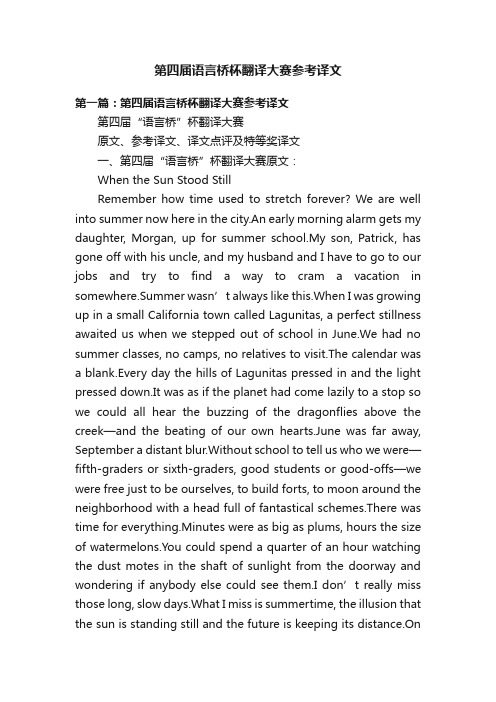
第四届语言桥杯翻译大赛参考译文第一篇:第四届语言桥杯翻译大赛参考译文第四届“语言桥”杯翻译大赛原文、参考译文、译文点评及特等奖译文一、第四届“语言桥”杯翻译大赛原文:When the Sun Stood StillRemember how time used to stretch forever? We are well into summer now here in the city.An early morning alarm gets my daughter, Morgan, up for summer school.My son, Patrick, has gone off with his uncle, and my husband and I have to go to our jobs and try to find a way to cram a vacation in somewhere.Summer wasn’t always like this.When I was growing up in a small California town called Lagunitas, a perfect stillness awaited us when we stepped out of school in June.We had no summer classes, no camps, no relatives to visit.The calendar was a blank.Every day the hills of Lagunitas pressed in and the light pressed down.It was as if the planet had come lazily to a stop so we could all hear the buzzing of the dragonflies above the creek—and the beating of our own hearts.June was far away, September a distant blur.Without school to tell us who we were—fifth-graders or sixth-graders, good students or good-offs—we were free just to be ourselves, to build forts, to moon around the neighborhood with a head full of fantastical schemes.There was time for everything.Minutes were as big as plums, hours the size of watermelons.You could spend a quarter of an hour watching the dust motes in the shaft of sunlight from the doorway and wondering if anybody else could see them.I d on’t really miss those long, slow days.What I miss is summertime, the illusion that the sun is standing still and the future is keeping its distance.Onsummer afternoons, nobody got any older.Kids didn’t have to worry about becoming adults, and adults didn’t have to worry about running out of adulthood.You could lie on your back watching clouds scud across the sky, and maybe later walk down to the store for a Popsicle.You could lose your watch and not miss it for days.These busy kids I’m raising today don’t know what summertime is.They are on city time.“My life is going too fast,” Patrick once grumbled as he got into bed.“This whole day went by just like that.I didn’t have enough fun.”He’s a city child, a child whose fun is packed into short, hurried weekends.Even in summer his hours grow shorter and begin to run together, faster and faster.It won’t be long before an hour—once an eternity—is for him, too, a walk to the grocery store, three phone calls, half a movie.Maybe that’s why we still need long school vacations—to anchor kids to the earth, keep them from rocketing too fast out of childhood.If they have enough time on their hands, they might be among the lucky ones who carry their summertime with them into adulthood.二、参考译文:夏日好时光可还记得以往时间像是永无止境地拉长了的?ADAIR LARA撰思果译夏天真正来到了我们居住的城市。
第四届“《英语世界》杯”翻译大赛比赛原文
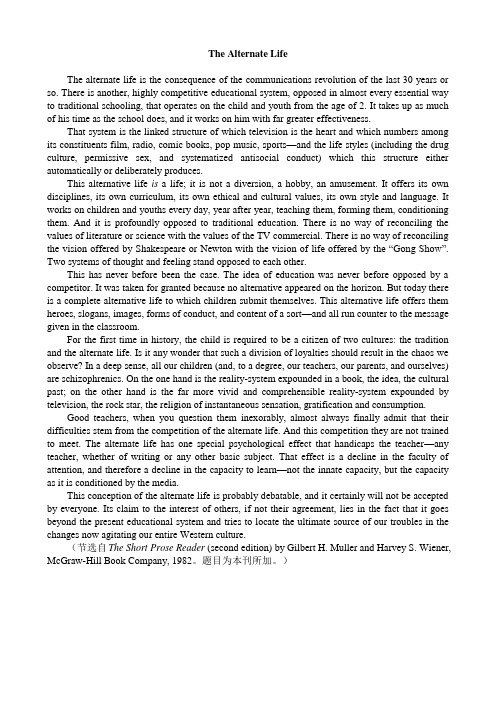
The Alternate LifeThe alternate life is the consequence of the communications revolution of the last 30 years or so. There is another, highly competitive educational system, opposed in almost every essential way to traditional schooling, that operates on the child and youth from the age of 2. It takes up as much of his time as the school does, and it works on him with far greater effectiveness.That system is the linked structure of which television is the heart and which numbers among its constituents film, radio, comic books, pop music, sports—and the life styles (including the drug culture, permissive sex, and systematized antisocial conduct) which this structure either automatically or deliberately produces.This alternative life is a life; it is not a diversion, a hobby, an amusement. It offers its own disciplines, its own curriculum, its own ethical and cultural values, its own style and language. It works on children and youths every day, year after year, teaching them, forming them, conditioning them. And it is profoundly opposed to traditional education. There is no way of reconciling the values of literature or science with the values of the TV commercial. There is no way of reconciling the vision offered by Shakespeare or Newton with the vision of life offered by the “Gong Show”. Two systems of thought and feeling stand opposed to each other.This has never before been the case. The idea of education was never before opposed by a competitor. It was taken for granted because no alternative appeared on the horizon. But today there is a complete alternative life to which children submit themselves. This alternative life offers them heroes, slogans, images, forms of conduct, and content of a sort—and all run counter to the message given in the classroom.For the first time in history, the child is required to be a citizen of two cultures: the tradition and the alternate life. Is it any wonder that such a division of loyalties should result in the chaos we observe? In a deep sense, all our children (and, to a degree, our teachers, our parents, and ourselves) are schizophrenics. On the one hand is the reality-system expounded in a book, the idea, the cultural past; on the other hand is the far more vivid and comprehensible reality-system expounded by television, the rock star, the religion of instantaneous sensation, gratification and consumption.Good teachers, when you question them inexorably, almost always finally admit that their difficulties stem from the competition of the alternate life. And this competition they are not trained to meet. The alternate life has one special psychological effect that handicaps the teacher—any teacher, whether of writing or any other basic subject. That effect is a decline in the faculty of attention, and therefore a decline in the capacity to learn—not the innate capacity, but the capacity as it is conditioned by the media.This conception of the alternate life is probably debatable, and it certainly will not be accepted by everyone. Its claim to the interest of others, if not their agreement, lies in the fact that it goes beyond the present educational system and tries to locate the ultimate source of our troubles in the changes now agitating our entire Western culture.(节选自The Short Prose Reader (second edition) by Gilbert H. Muller and Harvey S. Wiener, McGraw-Hill Book Company, 1982。
第三届英语世界杯翻译大赛

第三届“《英语世界》杯”翻译大赛启事秉承“给力英语学习,探寻翻译之星”的理念,在前两届翻译大赛成功举办的基础上,《英语世界》杂志社将联合南开大学、中国翻译协会社科翻译委员会、四川省翻译协会和成都通译翻译有限公司共同举办第三届“《英语世界》杯”翻译大赛。
欢迎广大英语爱好者,包括在书山学海奋力跋涉的莘莘学子,热情参与,晒秀佳译。
一、大赛形式:本次大赛为英汉翻译,参赛原文发布于商务印书馆网站()、《英语世界》2012年第5期和《英语世界》官方博客()。
二、参赛要求:1.参赛者年龄、性别、学历不限。
2.参赛译文须独立完成,不接受合作译稿。
3. 参赛译文及个人信息于截稿日期前发送至电子邮箱():(1)邮件主题请标明“翻译大赛”;(2)以附件一形式发送参赛者个人信息,文件名“参赛者信息”,内容包括:姓名、性别、出生年月日、学校或工作单位、通信地址(邮编)、电子邮箱和电话;(3)以附件二形式发送参赛译文,文件名“参赛译文正文”,内文规格:黑色小四号宋体,1.5倍行距,两端对齐。
4. 仅第一次投稿有效,不接受修改后的再投稿件。
5. 在大赛截稿之日前妥善保存参赛译文,勿在报刊、网络等任何媒体或以任何方式公布,否则将取消参赛资格并承担由此造成的一切后果。
三、大赛时间:截稿日期:2012年7月20日24时整。
评奖公布日期:2012年10月,在《英语世界》杂志、微博和博客中公布大赛评审结果。
四、奖项设置:所有投稿将由主办单位共同组织专家进行评审,分设一、二、三等奖及优秀奖。
一、二、三等奖获奖者将颁发奖金、证书和纪念品,优秀奖获奖者将颁发证书。
五、联系方式:六、特别说明:1. 本届翻译大赛不收取任何费用。
2. 本届翻译大赛只接受电子版投稿,不接受纸质投稿。
3. 参赛译文一经发现抄袭现象,即取消参赛资格。
《英语世界》杂志社2012年5月附:【翻译大赛原文】At Turtle BayBy E. B. WhiteMosquitoes have arrived with the warm nights, and our bedchamber is their theater under the stars. I have been up and down all night, swinging at them with a face towel dampen ed at one end to give it authority. This morning I suffer from the lightheadedness that comes from no sleep—a sort of drunkenness, very good for writing because all sense of responsibility for what the words say is gone. Yesterday evening my wife showed up with a few yards of netting, and together we knelt and covered the fireplace with an illusion veil. It looks like a bride. (One of our many theories is that mosquitoes come down chimneys.) I bought a couple of adjustable screen s at the hardware store on Third Avenue and they are in place in the windows; but the window sash es in this building are so old and irregular that any mosquito except one suffering from elephantiasis has no difficulty walking into the room through the space between sash and screen. (And then there is the evenlarger opening between upper sash and lower sash when the lower sash is raised to receive the screen—a space that hardly ever occurs to an apartment dweller but must occur to all mosquitoes.) I also bought a very old air-conditioning machine for twenty-five dollars, a great bargain, and I like this machine. It has almost no effect on the atmosphere of the room, merely chipping the edge off the heat, and it makes a loud grinding noise reminiscent of the subway, so that I can snap off the lights, close my eyes, holding the damp towel at the ready, and imagine, with the first stab, that I am riding in the underground and being pricked by pins wielded by angry girls. Another theory of mine about the Turtle Bay mosquito is that he is swept into one’s bedroom through the air conditioner, riding the cool indraft as an eagle rides a warm updraft. It is a feeble theory, but a man has to entertain theories if he is to while away the hours of sleeplessness. I wanted to buy some old-fashioned bug spray, and went to the store for that purpose, but when I asked the clerk for a Flit gun and some Flit, he gave me a queer look, as though wondering where I had been keeping myself all these years. “We got something a lot stronger than that,” he said, producing a can of stuff that contained chlordane and several other unmentionable chemicals. I told him I couldn’t use it because I was hypersensitive to chlordane. “Gets me right in the liver,” I said, throwing a wild glance at him.The mornings are the pleasantest times in the apartment, exhaustion having set in, the sated mosquitoes at rest on ceiling and walls, sleeping it off, the room a swirl of tortured bedclothes and abandoned garments, the vine s in their full leafiness filtering the hard light of day, the air conditioner silent at last, like the mosquitoes. From Third Avenue comes the sound of the mad builders—American cicada s, out in the noonday sun. In the garden the sparrow chants—a desultory second courtship, a subdued passion, in keeping with the great heat, love in summertime, relaxed and languorous. I shall miss this apartment when it is gone; we are quitting it come fall, to turn ourselves out to pasture. Every so often I make an attempt to simplify my life, burning my books behind me, selling the occasional chair, discarding the accumulated miscellany. I have noticed, though, that these purifications of mine—to which my wife submit s with cautious grace—have usually led to even greater complexity in the long pull, and I have no doubt this one will, too, for I don’t trust myself in a situation of this sort and suspect that my first act as an old horse will be to set to work improving the pasture. I may even join a pasture-improvement society. The last time I tried to purify myself by fire, I managed to acquire a zoo in the process and am still supporting it and carrying heavy pail s of water to the animals, a task that is sometimes beyond my strength.(选自 An E. B. White Reader, pp. 198~200,New YorkHarper & Row, 1966)。
英语世界翻译大赛原文
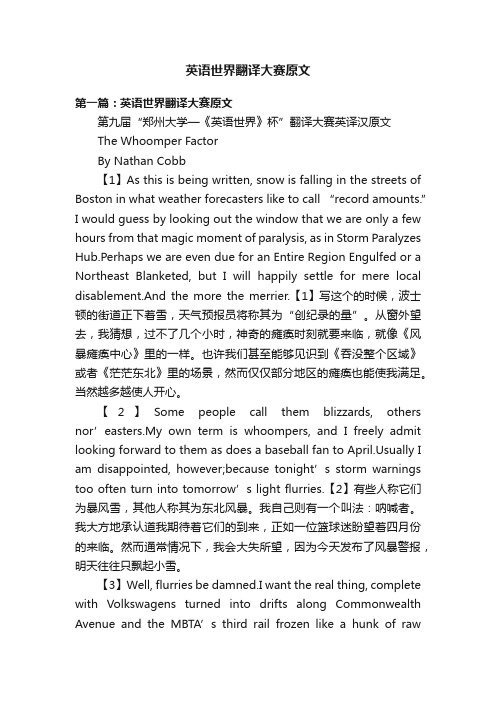
英语世界翻译大赛原文第一篇:英语世界翻译大赛原文第九届“郑州大学—《英语世界》杯”翻译大赛英译汉原文The Whoomper FactorBy Nathan Cobb【1】As this is being written, snow is falling in the streets of Boston in what weather forecasters like to call “record amounts.”I would guess by looking out the window that we are only a few hours from that magic moment of paralysis, as in Storm Paralyzes Hub.Perhaps we are even due for an Entire Region Engulfed or a Northeast Blanketed, but I will happily settle for mere local disablement.And the more the merrier.【1】写这个的时候,波士顿的街道正下着雪,天气预报员将称其为“创纪录的量”。
从窗外望去,我猜想,过不了几个小时,神奇的瘫痪时刻就要来临,就像《风暴瘫痪中心》里的一样。
也许我们甚至能够见识到《吞没整个区域》或者《茫茫东北》里的场景,然而仅仅部分地区的瘫痪也能使我满足。
当然越多越使人开心。
【2】Some people call them blizzards, others nor’easters.My own term is whoompers, and I freely admit looking forward to them as does a baseball fan to ually I am disappointed, however;because tonight’s storm warnings too often turn into tomorrow’s light flurries.【2】有些人称它们为暴风雪,其他人称其为东北风暴。
第六届“英语世界杯”翻译大赛原文、译文及评析

第六届“英语世界杯”翻译大赛原文、译文及评析第一篇:第六届“英语世界杯”翻译大赛原文、译文及评析第六届“《英语世界》杯”翻译大赛原文A Garden That Welcomes StrangersBy Allen LacyI do not know what became of her, and I never learned her name.But I feel that I knew her from the garden she had so lovingly made over many decades.The house she lived in lies two miles from mine –a simple, two-story structure with the boxy plan, steeply-pitched roof and unadorned lines that are typical of houses built in the middle of the nineteenth century near the New Jersey shore.Her garden was equally simple.She was not a conventional gardener who did everything by the book, following the common advice to vary her plantings so there would be something in bloom from the first crocus in the spring to the last chrysanthemum in the fall.She had no respect for the rule that says that tall-growing plants belong at the rear of a perennial border, low ones in the front and middle-sized ones in the middle, with occasional exceptions for dramatic accent.In her garden, everything was accent, everything was tall, and the evidence was plain that she loved three kinds of plant and three only: roses, clematis and lilies, intermingled promiscuously to pleasant effect but no apparent design.She grew a dozen sorts of clematis, perhaps 50 plants in all, trained and tied so that they clambered up metal rods, each rod crowned intermittently throughout the summer by a rounded profusion of large blossoms of dark purple, rich crimson, pale lavender, light blue and gleaming white.Her taste in roses was old-fashioned.There wasn’t a single modern hybrid tea rose or floribunda insight.Instead, she favored the roses of other ages – the York and Lancaster rose, the cabbage rose, the damask and the rugosa rose in several varieties.She propagated her roses herself from cuttings stuck directly in the ground and protected by upended gallon jugs.Lilies, I believe were her greatest love.Except for some Madonna lilies it is impossible to name them, since the wooden flats stood casually here and there in the flower bed, all thickly planted with dark green lily seedlings.The occasional paper tag fluttering from a seed pod with the date and record of a cross showed that she was an amateur hybridizer with some special fondness for lilies of a warm muskmelon shade or a pale lemon yellow.She believed in sharing her garden.By her curb there was a sign: “This is my garden, and you are welcome here.Take whatever you wish with your eyes, but nothing with your hand.”Until five years ago, her garden was always immaculately tended, the lawn kept fertilized and mowed, the flower bed free of weeds, the tall lilies carefully staked.But then something happened.I don’t know what it was, but the lawn was mowed less frequently, then not at all.Tall grass invaded the roses, the clematis, the lilies.The elm tree in her front yard sickened and died, and when a coastal gale struck, the branches that fell were never removed.With every year, the neglect has grown worse.Wild honeysuckle and bittersweet run rampant in the garden.Sumac, ailanthus, poison ivy and other uninvited things threaten the few lilies and clematis and roses that still struggle for st year the house itself went dead.The front door was padlocked and the windows covered with sheets of plywood.For many months there has been a for sale sign out front, replacing the sign inviting strangers to share her garden.I drive by that house almost daily and have been tempted to loada shovel in my car trunk, stop at her curb and rescue a few lilies from the smothering thicket of weeds.The laws of trespass and the fact that her house sits across the street from a police station have given me the cowardice to resist temptation.But her garden has reminded me of mortality;gardeners and the gardens they make are fragile things, creatures of time, hostages to chance and to st week, the for sale sign out front came down and the windows were unboarded.A crew of painters arrived and someone cut down the dead elm tree.This morning there was a moving van in the driveway unloading a swing set, a barbecue grill, a grand piano and a houseful of sensible furniture.A young family is moving into that house.I hope that among their number is a gardener whose special fondness for old roses and clematis and lilies will see to it that all else is put aside until that flower bed is restored to something of its former self.(选自 Patterns: A Short Prose Reader, by Mary Lou Conlin, published by Houghton Mifflin Company, 1983.)参考译文一座向陌生人敞开的花园文/〔美〕艾伦·莱西译/曹明伦我并不知晓她当时的境遇,也从未听说过她的姓名,但我觉得我曾了解她,因为她精心照料过数十年的那座花园。
第十一届“英语世界杯”翻译大赛英译汉原文
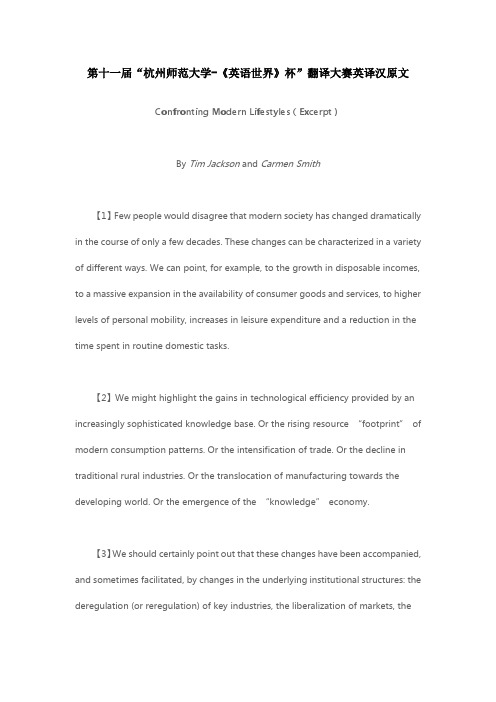
第十一届“杭州师范大学-《英语世界》杯”翻译大赛英译汉原文Confronting Modern Lifestyles(Excerpt)By Tim Jackson and Carmen Smith【1】Few people would disagree that modern society has changed dramatically in the course of only a few decades. These changes can be characterized in a variety of different ways. We can point, for example, to the growth in disposable incomes, to a massive expansion in the availability of consumer goods and services, to higher levels of personal mobility, increases in leisure expenditure and a reduction in the time spent in routine domestic tasks.【2】We might highlight the gains in technological efficiency provided by an increasingly sophisticated knowledge base. Or the rising resource “footprint”of modern consumption patterns. Or the intensification of trade. Or the decline in traditional rural industries. Or the translocation of manufacturing towards the developing world. Or the emergence of the “knowledge”economy.【3】We should certainly point out that these changes have been accompanied, and sometimes facilitated, by changes in the underlying institutional structures: the deregulation (or reregulation) of key industries, the liberalization of markets, theeasing of international trade restrictions, the rise in consumer debt and the commoditization of previously noncommercial areas of our lives.【4】We could also identify some of the social effects that accompanied these changes: a faster pace of life; rising social expectations; increasing divorce rates; rising levels of violent crime; smaller household sizes; the emergence of a “cult of celebrity”; the escalating “message density”of modern living; increasing disparities (in income and time) between the rich and the poor, the emergence of “postmaterialist”values; a loss of trust in the conventional institutions of church, family, and state; and a more secular society.【5】It is clear, even from this cursory overview, that no simple overriding “good”or “bad”trend emerges from this complexity. Rather, modernity is characterized by a variety of trends that often seem to be set (in part at least) in opposition to each other. The identification of a set of “postmaterialist”values in modern society appears at odds with the increased proliferation of consumer goods. People appear to express less concern for material things, and yet have more of them in their lives.【6】The abundance offered by the liberalization of trade is offset by the environmental damage from transporting these goods across distances to reach our supermarket shelves. The liberalization of the electricity market has increasedthe efficiency of generation, reduced the cost of electricity to consumers and at the same time made it more difficult to identify and exploit the opportunities forend-use energy efficiency.【7】To take another example, the emergence of the knowledge economy has increased the availability and the value of information. Simultaneously, it has intensified the complexity of ordinary decision-making in people’s lives. As Nobel laureate Hebert Simon has pointed out, information itself consumes scarce resources. “What information consumes is rather obvious: it consumes the attention of its recipients. Hence a wealth of information creates a poverty of attention, and a need to allocate that attention efficiently among the overabundance of information sources that might consume it”. This consuming effect of information makes the concept of “informed choice”at once more important and at the same time more difficult to achieve in modern society.【8】These examples all serve to illustrate that modern lifestyles are both complex and haunted by paradox. This is certainly one of the reasons why policy makers have tended to shy away from the whole question of consumer behavior and lifestyle change. It is clear nonetheless that coming to grips with consumption patterns, understanding the dynamics of lifestyle and influencing people’s attitudes and behaviors are all essential if the kinds of deep environmental targets demanded by sustainable development are to be achieved.。
大学英语竞赛全文翻译教案
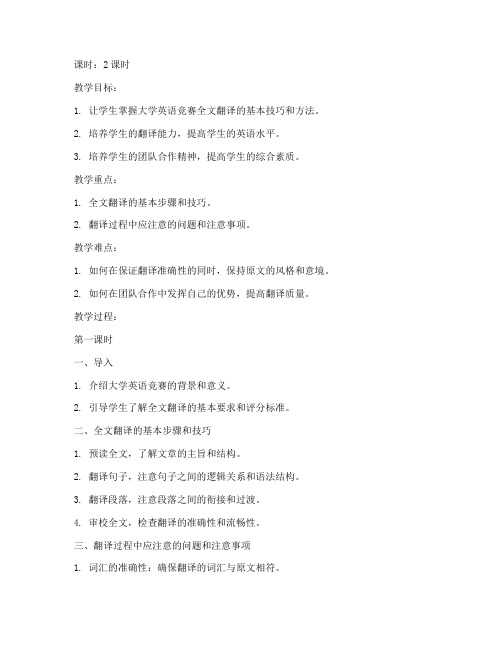
课时:2课时教学目标:1. 让学生掌握大学英语竞赛全文翻译的基本技巧和方法。
2. 培养学生的翻译能力,提高学生的英语水平。
3. 培养学生的团队合作精神,提高学生的综合素质。
教学重点:1. 全文翻译的基本步骤和技巧。
2. 翻译过程中应注意的问题和注意事项。
教学难点:1. 如何在保证翻译准确性的同时,保持原文的风格和意境。
2. 如何在团队合作中发挥自己的优势,提高翻译质量。
教学过程:第一课时一、导入1. 介绍大学英语竞赛的背景和意义。
2. 引导学生了解全文翻译的基本要求和评分标准。
二、全文翻译的基本步骤和技巧1. 预读全文,了解文章的主旨和结构。
2. 翻译句子,注意句子之间的逻辑关系和语法结构。
3. 翻译段落,注意段落之间的衔接和过渡。
4. 审校全文,检查翻译的准确性和流畅性。
三、翻译过程中应注意的问题和注意事项1. 词汇的准确性:确保翻译的词汇与原文相符。
2. 语法结构的正确性:注意句子成分的搭配和语法规则。
3. 风格和意境的保持:在翻译过程中,尽量保持原文的风格和意境。
4. 团队合作:在团队合作中,发挥自己的优势,提高翻译质量。
四、案例分析1. 选择一篇具有代表性的英语文章,进行全文翻译。
2. 学生分组,每组负责翻译文章的一个部分。
3. 各组完成翻译后,进行讨论和修改。
4. 教师对翻译结果进行点评和总结。
第二课时一、复习上节课所学内容1. 回顾全文翻译的基本步骤和技巧。
2. 总结翻译过程中应注意的问题和注意事项。
二、提高翻译能力的方法1. 多阅读英语文章,积累词汇和语法知识。
2. 多进行翻译练习,提高翻译技巧。
3. 学习翻译理论,了解翻译的基本原则和方法。
三、模拟竞赛1. 教师提供一篇英语文章,要求学生在规定时间内完成全文翻译。
2. 学生分组,每组负责翻译文章的一个部分。
3. 各组完成翻译后,进行讨论和修改。
4. 教师对翻译结果进行点评和总结。
四、总结1. 总结全文翻译的基本步骤和技巧。
2. 强调翻译过程中应注意的问题和注意事项。
国才杯外研社英语笔译大赛组
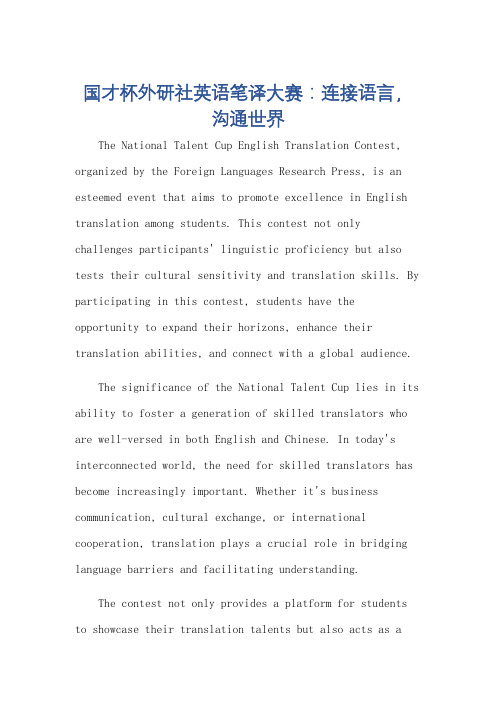
国才杯外研社英语笔译大赛:连接语言,沟通世界The National Talent Cup English Translation Contest, organized by the Foreign Languages Research Press, is an esteemed event that aims to promote excellence in English translation among students. This contest not only challenges participants' linguistic proficiency but also tests their cultural sensitivity and translation skills. By participating in this contest, students have the opportunity to expand their horizons, enhance their translation abilities, and connect with a global audience. The significance of the National Talent Cup lies in its ability to foster a generation of skilled translators who are well-versed in both English and Chinese. In today's interconnected world, the need for skilled translators has become increasingly important. Whether it's business communication, cultural exchange, or international cooperation, translation plays a crucial role in bridging language barriers and facilitating understanding.The contest not only provides a platform for students to showcase their translation talents but also acts as acatalyst for improving translation education in China. By participating, students gain valuable experience that prepares them for future careers in translation or related fields. At the same time, the contest also encourages teachers and educators to innovate in their teaching methods and curriculums, in order to better prepare students for the challenges of the globalized world.The National Talent Cup English Translation Contest also serves as a bridge between China and the rest of the world. Through translation, Chinese culture and perspectives are introduced to an international audience, promoting mutual understanding and respect. Similarly, the contest brings to light the diverse perspectives and voices from around the globe, enriching the cultural landscape of China.In conclusion, the National Talent Cup English Translation Contest is a valuable initiative that promotes excellence in translation, fosters cultural exchange, and builds bridges between languages and cultures. By participating in this contest, students not only enhance their translation skills but also gain a deeperunderstanding of the world and the importance of languagein connecting people and ideas.**国才杯外研社英语笔译大赛:沟通世界的桥梁**国才杯外研社英语笔译大赛,作为一项旨在提高学生英语翻译水平的重要赛事,不仅考验着参赛者的语言功底,更在检验他们的文化敏感度和翻译技巧。
第十三届“中南大学—《英语世界》杯”翻译大赛顾问、评委名单
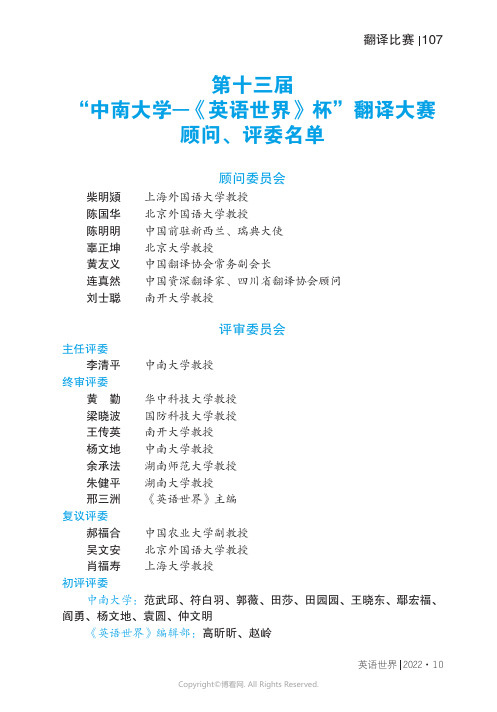
阎勇、杨文地、袁圆、仲文明 《英语世界》编辑部:高昕昕、赵岭
Copyright©博看网. All Rights Reserved.
英语世界 2022·10
翻译比赛 107
第十三届 “中南大学—《英语世界》杯”翻译大赛
顾问、评委名单
顾问委员会
柴明熲 上海外国语大学教授 陈国华 北京外国语大学教授 陈明明 中国前驻新西兰、瑞典大使 辜正坤 北京大学教授 黄友义 中国翻译协会常务副会长 连真然 中国资深翻译家、四川省翻译协会顾问 刘士聪 南开大学教授
评审委员会
主任评委 华中科技大学教授 梁晓波 国防科技大学教授 王传英 南开大学教授 杨文地 中南大学教授 余承法 湖南师范大学教授 朱健平 湖南大学教授 邢三洲 《英语世界》主编
复议评委 郝福合 中国农业大学副教授 吴文安 北京外国语大学教授 肖福寿 上海大学教授
第十一届“杭州师范大学—《英语世界》杯”翻译大赛获奖名单

第十一届“杭州师范大学—《英语世界》杯”翻译大赛获奖名单作者:来源:《英语世界》2020年第10期英译汉一等奖(1名)刘正飞嘉兴职业技术学院二等奖(2名)张建惠鲁东大学林天晴广东财经大学三等奖(3名)彭楚晗自由翻译安子尧自由译者赖桃广西民族大学优秀奖(43名)钱蒙生南京师范大学张含雪三峡大学郭晓阳自由职业张宇漾江苏师范大学张睿洺国际关系学院张思懿四川外国语大学孙琦西北大学王泽泽山东大学夏杨南京信息工程大学王晓慧中国人民大学王超凡中山大学附属第三医院苟巧巧成都文理学院左欣鑫四川外国语大学王亚委东北财经大学虞洋东北师范大学庞杨洋华中师范大学周圳南京林业大学董敬超自由职业李飞安徽大学姜兆淇杭州师范大学钱江学院熊霞中国民用航空飞行学院赵雁南浙江财经大学陈先宇中国巨石股份有限公司赵宇霞首都经济贸易大学李勇杰广东财经大学张鹏骞厦门大学嘉庚学院刘芸四川大学黄婉仪华南农业大学丁婷北京外国语大学李子纯中央民族大学刘常民台州学院史慧琳浙江大学孙丝雨中南林业科技大学涉外学院凌芊卉文华学院赵阳郑州大学外国语与国际关系学院董媛媛奈曼旗实验中学严雨琪南京林业大学李安晴中国人民大学袁冰心东华大学方倩云暨南大学胡淑媛暨南大学珠海校区翻译学院龚嘉诚苏州大学文正学院姚锡静中南财经政法大学汉译英一等奖(1名)刘向阳思爱普(中国)有限公司二等奖(2名)傅颖浙江商业技师学院何梓健广东外语外贸大学南国商学院三等奖(4名)周建军常州工学院毕明悦中国海洋大学江明霞成都理工大学彭楚晗自由翻译优秀奖(21名)陳颖盈宁波大学李杰杭州师范大学廖雪莹北京外国语大学马勖上海外国语大学张婷婷苏州大学麦嘉澄中山大学黄孟瑶华中师范大学张轩甄广东外语外贸大学胡文明腾讯公司熊婷北京航空航天大学朱莹北京化工大学费及竟上海工程技术大学外国语学院杨千禧北京化工大学熊霞中国民用航空飞行学院林静中国海洋大学赵宇彤延边大学邹建四川乐山施倩倩西南大学苗沈超上海师范大学天华学院施慧静上海工程技术大学白申昊 UCL(伦敦大学学院)组织奖(10名)杭州师范大学北京化工大学四川外国语大学内江师范学院广东财经大学四川大学宁波大学首都经济贸易大学中南林业科技大学广东外语外贸大学。
第十届“中国海洋大学—《英语世界》杯

第十届“中国海洋大学—《英语世界》杯”翻译大赛XX及原文“《英语世界》杯”翻译大赛肇始于2021 年,由商务印书馆《英语世界》XX 社主办。
短短数载,大赛参赛人数屡创新高,目前已经成为国内最有影响的翻译赛事之一。
为推动翻译学科进一步,促进中外文化交流,我们秉承“给力英语学习,探寻翻译之星”的理念,于2021年继续举办第十届“《英语世界》杯"翻译大赛,诚邀广大翻译爱好者积极参与,比秀佳译。
第十届“《英语世界》杯”翻译大赛得到中国海洋大学的大力支持,并由该校冠名本届比赛.2021年的翻译大赛包含“英译汉”和“汉译英”两个组别.大赛初评交给合办院校的老师,以确保大赛评审的权威性和公信力。
复评和终评我们将延续历届传统,从全国XX地邀请知名翻译专家进行评审。
合办院校中国海洋大学外国语学院赞助单位UXXXXre EducationXX韬略教育科技有限XX旗下品牌,秉承“您身边的留学专家”的理念,开展包括XX、XX、加拿大、、新西兰、XX等主流留学XX的留学申请及游学服务.UXXXXre核心成员毕业于世界名校,拥有申请牛津、剑桥、哈佛、斯坦福等大学的丰富经验,深谙欧美名校录取之道,迄今已助力上万名学生实现世界名校梦.协办单位中国翻译协会XX科学翻译XX中国外文局翻译专业资格考评中心中国英汉语比较研究会英汉翻译研究学科XXXX省翻译协会XX省翻译协会XX省翻译理论与教学研究会XX省翻译协会XX省翻译协会XX通译翻译有限XX《外语与翻译》编辑部英文巴士网赛程及评审1. 2021年5月发布大赛XX及原文,10月公布获奖结果,见诸以下XX:《英语世界》2021年第5期(XX及原文)和第10期(获奖结果等)、《英语世界》XX(www。
yingyushijie。
XX)、《英语世界》XX公众平台(XX号:theworldofenglish)、《英语世界》XX方微博(weibo。
XX/theworl dofenglish)、中国海洋大学外国语学院XX(flc。
- 1、下载文档前请自行甄别文档内容的完整性,平台不提供额外的编辑、内容补充、找答案等附加服务。
- 2、"仅部分预览"的文档,不可在线预览部分如存在完整性等问题,可反馈申请退款(可完整预览的文档不适用该条件!)。
- 3、如文档侵犯您的权益,请联系客服反馈,我们会尽快为您处理(人工客服工作时间:9:00-18:30)。
第九届“郑州大学—《英语世界》杯”翻译大赛英译汉原文The Whoomper FactorBy Nathan Cobb【1】As this is being written, snow is falling in the streets of Boston in what weather forecasters like to call “record amounts.” I would guess by looking out the window that we are only a few hours from that magic moment of paralysis, as in Storm Paralyzes Hub. Perhaps we are even due for an Entire Region Engulfed or a Northeast Blanketed, but I will happily settle for mere local disablement. And the more the merrier.【1】写这个的时候,波士顿的街道正下着雪,天气预报员将称其为“创纪录的量”。
从窗外望去,我猜想,过不了几个小时,神奇的瘫痪时刻就要来临,就像《风暴瘫痪中心》里的一样。
也许我们甚至能够见识到《吞没整个区域》或者《茫茫东北》里的场景,然而仅仅部分地区的瘫痪也能使我满足。
当然越多越使人开心。
【2】Some people call them blizzards, others nor’easters. My own term is whoompers, and I freely admit looking forward to them as does a baseball fan to April. Usually I am disappointed, however; because tonight’s storm warnings too often turn into tomorrow’s light flurries.【2】有些人称它们为暴风雪,其他人称其为东北风暴。
我自己则有一个叫法:呐喊者。
我大方地承认道我期待着它们的到来,正如一位篮球迷盼望着四月份的来临。
然而通常情况下,我会大失所望,因为今天发布了风暴警报,明天往往只飘起小雪。
【3】Well, flurries be damned. I want the real thing, complete with Volkswagens turned into drifts along Commonwealth Avenue and the MBTA’s third rail frozen like a hunk of raw meat. A storm does not even begin to qualify as a whoomper unless Logan Airport is shut down for a minimum of six hours.【3】好吧,小雪令人厌恶。
我想要实实在在的东西,包括大众汽车成了联邦大道的漂浮物,波士顿市运输局的第三条轨道像一大块生肉一样被冻住了。
除非洛根机场至少关闭六个小时,否则这一场风暴根本配不上称作呐喊者。
【4】The point is, whoompers teach us a lesson. Or rather several lessons. For one thing, here are all these city folks who pride themselves on their instinct for survival, and suddenly they cannot bear to venture into the streets because they are afraid of being swallowed up. Virtual prisoners in their own houses is what they are. In northern New England, the natives view nights such as this with casual indifference, but let a whoomper hit Boston and the locals are not only knee deep in snow but also in befuddlement and disarray.【4】关键是,呐喊者们给了我们一个教训。
或者几个教训。
一方面,所有的城里人为他们的生存本能感到自豪,霎时间,他们不能忍受街道上的风险因为害怕被吞没。
他们就好像是自己房子里的囚犯。
在新英格兰的北部,当地人对这样的夜晚习以为常,但是让一位呐喊者袭击波士顿,居民不仅深陷雪中而且陷入困境和混乱。
【5】The lesson? That there is something more powerful out there than the sacred metropolis. It is not unlike the message we can read into the debacle of the windows falling out of the John Hancock Tower; just when we thin k we’ve got the upper hand on the elements, we find out we are flies and someone else is holding the swatter. Whoompers keep us in our place.【5】教训?那里有比神圣的大都市更强大的东西。
这与我们可以从约翰•汉考克大厦掉落下来的崩溃信息没什么不同;正当我们自认为凌驾于风雨之上时,才发现我们只是沧海一粟,另有高人将我们玩弄于股掌之间。
呐喊者们将我们困在原地。
【6】They also slow us down, which is not a bad thing for urbania these days. Frank ly, I’m of the opinion Logan should be closed periodically, snow or not, in tribute to the lurking suspicion that it may not be all that necessary for a man to travel at a speed of 600 miles per hour. In a little while I shall go forth into the streets and I know what I will find. People will actually be walking, and the avenues will be bereft of cars. It will be something like those marvelous photographs of Back Bay during the nineteenth century, wherein the lack of clutter and traffic makes it seem as if someone has selectively airbrushed the scene.【6】他们也使我们放慢了速度,如今对于乌尔巴尼亚来说不是一件坏事。
坦率地讲,为了向潜在的怀疑致敬,即可能不是每个人都必须以每小时600英里的速度行走,我认为不管下不下雪,洛根应该定期关门。
我应该去街道上走上一小会儿就能知道自己寻找什么。
实际上人们将要行走,大道上没有车子。
如同19世纪巴克湾那些【7】And, of course, there will be the sound of silence tonight. It will be almost deafening. I know city people who have trouble sleeping in the country because of the lack of noise, and I suspect this is what bothers many of them about whoompers. Icy sidewalks and even fewer parking spaces we can handle, but please, God, turn up the volume. City folks tend not to believe in anything they can’t hear with their own ears.【8】It should also be noted that nights such as this are obviously quite pretty, hiding the city’s wounds beneath a clean white dressing. But it is their effect on the way people suddenly treat each other that is most fascinating, coming as it does when city dwellers are depicted as people of the same general variety as those New Yorkers who stood by when Kitty Genovese was murdered back in 1964.【9】There’s nothing like a good whoomper to get people thinking that everyone walking towards them on the sidewalk might not be a mugger, or that saying hello is not necessarily a sign of perversion. You would think that city people, more than any other, would have a strong sense of being in the same rough seas together, yet it is not until a quasi catastrophe hits that many of them stop being lone sharks.【10】But enough of this. There’s a whoomper outside tonight, and it requires my presence.。
